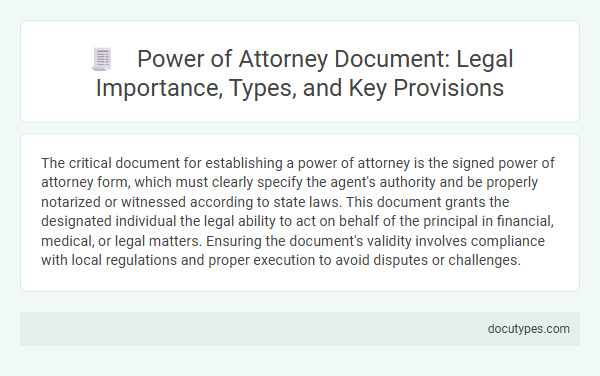The critical document for establishing a power of attorney is the signed power of attorney form, which must clearly specify the agent's authority and be properly notarized or witnessed according to state laws. This document grants the designated individual the legal ability to act on behalf of the principal in financial, medical, or legal matters. Ensuring the document's validity involves compliance with local regulations and proper execution to avoid disputes or challenges.
Understanding the Power of Attorney Document
The Power of Attorney document is critical for legally authorizing someone to act on another person's behalf. It clearly defines the scope of authority granted, whether for financial, medical, or legal decisions. Understanding this document ensures that the principal's intentions are accurately represented and legally enforceable.
Legal Importance of a Power of Attorney
The critical document for establishing a Power of Attorney is the Power of Attorney form itself, which must be signed and notarized to be legally valid. This document grants authority for decision-making to a designated agent on behalf of the principal.
Understanding the legal importance of a Power of Attorney is essential because it allows Your agent to act in financial, medical, or legal matters when You are unable to do so. Without this document, there may be significant delays or complications in managing Your affairs during incapacity.
Types of Power of Attorney
The critical document for establishing a Power of Attorney is a legally executed POA form that clearly outlines the authority granted. Understanding the various types of Power of Attorney helps ensure your intentions are properly documented and enforceable.
- Durable Power of Attorney - Grants authority to make financial and legal decisions even if you become incapacitated.
- Medical Power of Attorney - Allows appointment of an agent to make healthcare decisions on your behalf.
- Limited Power of Attorney - Restricts the agent's powers to specific tasks or timeframes as defined in the document.
General vs. Special Power of Attorney
The critical document for establishing a Power of Attorney is the Power of Attorney agreement itself. This legal instrument authorizes an agent to act on behalf of the principal in specified matters.
A General Power of Attorney grants broad authority over financial, legal, and business affairs, allowing the agent to make decisions in almost all matters. A Special Power of Attorney limits the agent's powers to particular tasks or situations, such as handling a real estate transaction or managing a bank account. Your choice depends on the level of control and scope of authority you intend to delegate.
Durable vs. Non-Durable Power of Attorney
Establishing a Power of Attorney (POA) requires a specific legal document that grants an agent authority to act on behalf of the principal. The distinction between Durable and Non-Durable Power of Attorney significantly affects the document's effectiveness over time.
- Durable Power of Attorney - Remains in effect even if the principal becomes incapacitated, ensuring continuous authority for the agent.
- Non-Durable Power of Attorney - Terminates automatically if the principal loses mental capacity, limiting the agent's power in critical situations.
- Legal Document Requirement - The power of attorney must be a written document, signed, and notarized to be legally valid and enforceable.
Key Provisions in a Power of Attorney Document
| Key Provision | Description |
|---|---|
| Grantor Information | Identifies the person creating the power of attorney, including full legal name and address, establishing the authority source. |
| Agent/Attorney-in-Fact Details | Specifies the person designated to act on the grantor's behalf, including name, relationship, and scope of authority granted. |
| Scope of Authority | Defines the specific powers given to the agent, such as financial decisions, real estate transactions, or healthcare directives. |
| Effective Date | Indicates when the power of attorney becomes operative, either immediately upon signing or upon occurrence of a specified event. |
| Durability Clause | Ensures the power of attorney remains effective if the grantor becomes incapacitated, a critical legal aspect for continuity. |
| Expiration or Termination Conditions | Specifies when the power of attorney ends, such as upon revocation, a date, or the grantor's death. |
| Signature and Notarization | Includes the grantor's signature, date, and often notarization or witness attestations to validate the document's legality. |
Requirements for a Legally Valid Power of Attorney
The critical document for establishing a power of attorney is the Power of Attorney (POA) agreement itself. This document must clearly specify the powers granted and the identities of both the principal and the agent.
Legal requirements for a valid power of attorney include the principal's sound mental capacity and voluntary consent. The POA must be signed, dated, and in some jurisdictions, notarized or witnessed to ensure enforceability.
Revocation and Termination of Power of Attorney
Which document is critical for establishing a power of attorney? The power of attorney document itself is essential for granting authority to an agent. Revocation and termination of power of attorney require formal documentation to ensure your intentions are legally recognized.
Responsibilities of an Attorney-in-Fact
The most critical document for establishing a power of attorney is the Power of Attorney (POA) form itself. This legal instrument grants specific authority to the attorney-in-fact to act on behalf of the principal.
- Fiduciary Duty - The attorney-in-fact must act in the best interests of the principal at all times.
- Scope of Authority - The document defines the exact powers granted, which can range from financial decisions to medical care.
- Accountability - The attorney-in-fact is responsible for keeping accurate records and may be required to report to the principal or courts.
Understanding these responsibilities is essential to ensure the power of attorney is executed lawfully and ethically.
Which Document Is Critical for Establishing a Power of Attorney? Infographic

